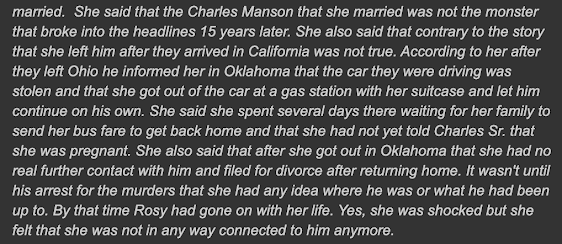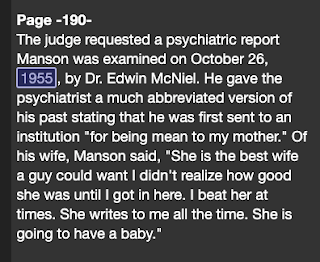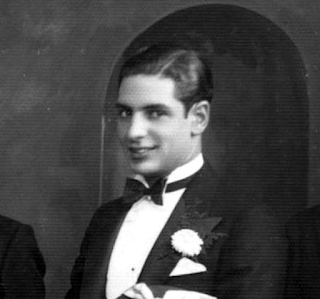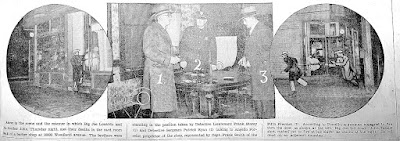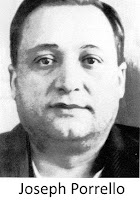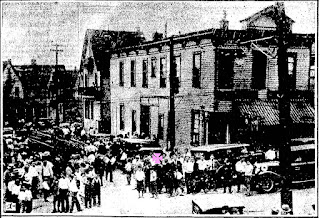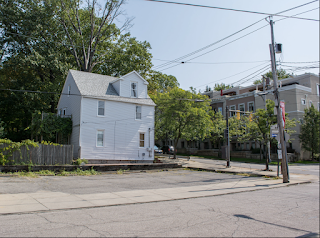Deb quickly shuts down Rosalie's fibbing. The birth records she used remain available online for verification if you're a crazy person like me who needs to prove things to themselves instead of choosing a squad and repeating (often) unverified reruns forever alongside a chorus of new best friends in a (personalized) online wind tunnel.
Always remember that no one in history ever anticipated the Internet. You have a clear advantage over researchers in the past. Even in the last decade or year. Nobody needs to tell you anything. Look for yourself.
Since we're all liars at times, I propose we forgive Rosalie and move on.
While there are many books out there brimming with information, and I think we can bring several into our discussions down the road, let's keep things simple for today. I used the most famous work published on the subject, Helter Skelter, and compared it to arguably the most informative eye witness account ever produced in the genre, Lynette Fromme's Reflexion.
If you haven't bought Lynette's book yet you should today. And read it more than once. If she's not the smartest resident of this unforgiving tar pit, she is certainly at the top of the class.
Charlie doesn't mention anything about his time in California with Rosalie in Reflexion. As always, all citations from Fromme's book refer to the Kindle version.
"When I married Rosie at twenty years old, I had never been around chicks. Rosie played me like the fool that I was (103)."
Sixteen year old Rosalie must've really done a number on him. She was cool like cucumber salad when freedom was on the line though. Vince forces Curt to point out that Charlie beat on a pregnant woman.
via Helter Skelter
Such is life. One person is told a lie while another person hears the truth. Or both people are bullshitted. You know we live in dangerous times. No one should be alone.
I said I wouldn't hate on lies told for perseverance anymore and shall refrain today. Survival is an absolute necessity. No two ways about it.
Charlie's version of 1954-1958 in Fromme's book differs from what I found in public records so I made myself a basic timeline in an attempt to keep everything straight in my mind. I left some things out so we don't have to discuss pimping sixteen year old girls and various other successful and failed capers.
Let's dive in.
-----------------------------------------------------------------------------------------------------------------------------
May, 1954 - Charlie earns an early release for good behavior at the Maximum Security Reformatory in Chillicothe, Ohio, and moves in with his aunt and uncle. God bless you, Glenna xo. High school freshman Rosalie Jean Willis lives and works nearby.
"One of my mom's husbands was a window washer at a U.S. Courthouse. His name was Deere. They got me out of prison and she got me a 1954 Ford. I traded it for a 1952 Cadillac and used the name Charlie Deere (103)."
---
I imagined a convo that went a something like this:
"Hey, Judge. Got a minute?"
"Sure thing! What can I help you with, Mr. Bailiff?"
"You know that window washer guy who's always out front cleaning the glass when we arrive at work in the mornings? Deere? He asked if you might consider calling over to the prison and telling them to cut his wife's son loose?"
"Say no more, cherished friend and sworn lodge brother. I've always had a soft spot for squeegee men."
(I could not find a husband named Deere online for Kathleen but maybe you can. I didn't look super hard.)
The Fifties in Fromme:
The final screen cap is from Frank Costello's FBI files. Charlie and Frank are together in Lewisburg in 1952. Manson claims Big Frank raised his hand and vouched for him in the Fromme passages above. There's no way of proving they were buddies but there are more hints in our pages from Fromme.
Charlie talks in code so I always look up every name he mentions. For example, he mentions Dewey in his letter to Fromme. Dewy took down Murder, Inc. Charlie later did time with Murder, Inc. member Frankie Carbo. You remember
Frankie don'tcha?
Even though he killed Bugsy Beatty, Carbo is small potatoes compared to the rest of that backstory. Murder, Inc was a dark child of some the most infamous of NYC mafia fathers.
Meyer Lansky. The Brain. Lucky Luciano. Frank Costello.
Let's jump back to Charlie's life in the '50's as told by Fromme. He is released from Chillicothe in 1954 and heads to Cleveland in Fromme's version of events.
That's John Scalish. He's the godfather of the Cleveland mob when Charlie shows up with a stolen car. A Viking Englishwoman says Scalish looks like my Italian brother. I don't think I've ever been that dashing but I do feel like I make that face a lot.
Scalish had five sisters although I'm unsure if Charlie was implying something or not. I have a mysterious relative everyone in my family thinks was a con man who is buried near Scalish and the rest of Cleveland's gangster royalty. Danny Greene. People blown up by Danny Greene. Scoundrel after glorious scoundrel.
They're all waiting to resurrect inside this beautiful, old, city cemetery. Huge mature trees dot the spacious landscape making Calvary Cemetery a great place for a walk. You don't want your car to break down outside the gates though. Times have changed in the neighborhood.
I spent a day learning about the Cleveland mob last week and here is the road to Charlie. Scalish was the second true godfather of the city. Before power was consolidated, several gangs, Jewish and Italian, operated at the same time and sometimes worked together. Eventually, the money coming in from Prohibition became outlandish and everyone started fighting.
Scalish married a Jewish girl whose father was the boss of a Jewish crew. Maybe they married to consolidate power or perhaps they were deeply in love. I always choose love.
Around the same time, a local gang split into two rival gangs and a boss and his brother were killed in a Little Italy barbershop with New York's blessing. This is how it went down: Boss Joseph Lonardo, pictured below, steamed to Italy supposedly on vacation.
Big Joe left his brother John (below) and another fellow in charge while he visited overseas.
This is the other fellow, Big Joe's advisor, Salvatore "Black Sam" Todaro.
I know what you're thinking. Dude looks totally trustworthy. I felt the same way. The backstory here is Big Joe and the guys who split off into their own crew, the Porrello's, were lifelong friends. Both families emigrated from Sicily together and even named kids after one another.
This was until Prohibition changed everything. Greed is number two on the list of the
Seven Deadly Sins and don't ever forget it.
Right. So anyway Black Sam cozies up to John while Big Joe is in Italy (It-LEE) and convinces him everything is copasetic between the feuding crews. When Joe returns, Black Sam lures Joe and John to Angelo Porrello's barber shop for a sit-down. Bang bang bang you know the deal. Joe and John are made to feel comfy with a card game, ambushed, and slain by their former friends.
Following this act of magnificent treachery, Joseph Porrello becomes head corn sugar baron in Cleveland. Corn sugar is essential to every bootlegging operation in case you've never been a bootlegger.
Porrello was suddenly king but he was also no fool. At least not at this time. Later, definitely. But for now he made Black Sam believe he was the boss of the crew.
Killing Lonardo got rid of one enemy but another enemy immediately stepped up like they always do in organized crime. The new guys were called the Mayfield Road Mob. Fearing the MRM and attempting to place the local crown officially upon his head, Joseph Porrello holds what becomes the first big mafia summit in a downtown Cleveland hotel on December 5, 1928. Top mafiosos from New York and around the country began to arrive.
Momentarily, the Cleveland cops said, "Dudes, how stupid do you think we are?" Gangsters were arrested as they showed up. Fearing his imminent demise, Porrello paid everyone's bail. No one was overly offended, Porrello was secretly handed Cleveland, and the MRM was told to go kick rocks.
To their credit, the MRM was like okay cool yeah we understand no hard feelings. I'm joshing. Don't be so gullible. The MRM waited until June and violently ended Black Sam's lifetime of double-dealing in front of the same barber shop Big Joe and John Lonardo were killed.
Black Sam, stooge the entire time and betrayed at the end, was gunned down by Lonardo's wife, his son Angelo (named after traitorous barber shop owner Angelo Porrello), and a Lonardo hit man. All had defected to the MRM.
By the end of Prohibition, most of the Porrello gang is either dead or with the MRM. Porrello is invited to a sit-down at the Venetian restaurant on Mayfield Road. The building on the right in this photo from 1930 still exists today. You probably guessed that Porrello meets his end here and you are correct.
Porrello and his bodyguard foolishly believe they are picking up more than a hundred grand in today's money. Greed, friends, it's a killer. Two hitmen light them up at their restaurant table. Porrello never moves and is later found with his unlit cigarette hanging from his lip.
The bodyguard is wounded in each side, makes it outside, collapses on the sidewalk out front, the restaurant was where the parking lot is now btw, and perishes following two more shots to the dome. Neither killer was ever identified.
The owner of the Venetian Restaurant, Frank Milano, leader of the MRM, is responsible for the assassinations. But the coast is not clear yet. Porrello's brother Vincenzo "Jim" Porrello becomes the new boss of the Cleveland mafia and vows revenge on his brother's killers. His reign lasts three long weeks before the back of his head is blown off in a grocery store on his home turf. A third Porrello brother, Raymond, swears double revenge. I'm sure you see where this is going.
Raymond's house explodes three weeks later. Bits of brick, glass, and wood splinters fill the sky before cascading back to Earth in a grotesque shower. Raymond is not home at the time but the Porrello's are nearly finished in the crime game. A couple more guys and a wife await their murders but the Porrello run is over.
Frank Milano officially becomes the next King of Cleveland. The MRM is mentioned in
The Godfather 2 and called by its first name, The Lakeville Gang. Johnny Ola and Michael Corleone discuss the gang and Hyman Roth in that clip. "Our friend in Miami." Roth is Meyer Lansky's character's name in the film.
I wanna be handsome like young Al Pacino just for one day. "Brenda McCann, leave those slippies alone," I'd say while removing a white bow tie I was born knowing how to knot. "Let's go hang out with Hynson and August."
In 1931, Frank Milano joins the
National Crime Syndicate with Meyer Lansky and Lucky Luciano. Meyer Lansky is one of the players connecting the Manson cases to Cuba and JFK. If not for the JFK and RFK assassinations and
Black Flag concert flyers, I would not be here today.
In case you're keeping score, Angelo Lornado, Big Ange, killer of Black Sam, was a brother in law of eventual godfather John Scalish. Angelo swore and got revenge on his father's killers and then the government removed him from the mix. He currently resides in Calvary with his obligatory statue and is surrounded by family, friends, and enemies.
And my relative who does not have a statue.
John Scalish was running things as the godfather of Cleveland for ten years when Charlie showed up. Cleveland had a big piece of the Teamsters and were also behind Moe Dalitz in Las Vegas. The neighborhood Charlie describes housed Scalish's headquarters. No idea on the Dago Mick. If you can prove Murphy was Danny Greene, I will send you a giant-sized candy bar and a box filled with assorted zoo zoos and wham whams.
Charlie might be lying about his connections to the most powerful mafia group in the US but then again he might be telling the truth. He lied all the time but was also honest about things that made me question his sanity, so I am never sure.
(B.S. Murphy had parts or all of this worked out almost three decades ago. I'm sure it's also in some other books I'm unable to buy and on ten websites that all look like 1995, but I wanted to put it here on the MFB for everyone who arrives after this post and wants to look into Charlie's time in Cleveland, Ohio. +ggw)
-------------
All righty then. First, we covered Rosalie's lie about never making it out to California with Charlie. Next, we squared away Charlie's 1950's as told to Lynette Fromme, and explained the people and their connections inhabiting those years of his life. All that's left is a bit more from Vince and Curt, and our Charlie/Rosie/Mafia timeline culled from public records and
author Jeff Guinn.
Oh. Duh. We also discovered that Rosalie's mom and sister(s) were somehow already out in Los Angeles when Charlie and Rosalie arrived. Idk if this is new info for the bloated corpus or if Ivor Davis published the news while taking a poop one day before I was born or if some other person who is the coolest toughest senior at Manson High carved it into the bathroom stall with his switchblade but the discovery was an eye-opener for me and the rest of the nerd table. I'm the guy in the letterman jacket showing his fellow concert bandmates the 1350 he got on his SAT in case any haters ever want to stop by and say hello after you finish your lunch of Marlboros and Little Debbies.

Have you ever noticed that even the extras with no speaking parts in this drama are good looking? What's up with that? Paranoid me would surely scream crisis actors were I not so grounded in the universe and oneness and love. I'm not quite sure how these people escaped our dirty river and made it all the way to La La Land and the mighty Pacific and but I'd high five the shit out of them if they were here right now.
Did Bugliosi not know Rosie's family was out there? The number one selling crime book of all time.
I struggled to find information on Kathleen and Rosalie's roommate situation. If anyone wants to fill in the blanks with an address, I would be much obliged. Or just grateful really. We don't have to owe one another favors or anything.
Friends, I think we're finished for this week. I provided Buntline with millions of things to look up and typed for two straight days. The remainder of my working timeline is below. I look forward to being called out on every bit of minutia or whatever the opposite of minutia is...bigmutia maybe Idk but basically whatever I got wrong.
Until next week...
Keep it Green.
xo
-------------
August-ish 1955 - Charlie and Rosalie arrive in Los Angeles. Charlie is caught with their stolen car and faces federal charges for crossing state lines with it.
October 1955 - Charlie receives five years probation because Rosalie is preggers.
March, 1956 - Charlie fails to appear at court in Los Angeles over a federal auto theft charge filed in Florida and is subsequently arrested in Indianapolis, Indiana. His probation is revoked while he awaits sentencing. Rosalie has carried their son nearly to full term.
April 10, 1956 - Jay White is born in Los Angeles. (Jay dies by suicide at age 37.)
December 15, 1956 - Charlie receives three years in San Pedro for violating his probation. I'm so-so on this date. Why would they make him wait nine months? Merry Christmas regardless.
March, 1957 - Rosalie stops visiting Charlie in prison. He finds out from his mom that Rosalie moved in with a new dude.
July 9, 1957 - Rosalie files for divorce from Charlie. She is two months pregnant by Jack B. White.
February 3, 1958 - Jesse James White is born. (Jesse dies of an overdose at age 28.)
September 10, 1958 - Rosalie's divorce with Charlie is official. Charlie is paroled around the same time.
November 8, 1958 - Rosalie marries Jack B. White.
April 4, 1959 - Jed White is born. (Jed dies in a shotgun accident at age 11.)
-------------
Risin' up to paradise. I know I'm gonna shine.

